| Srl | Item |
| 1 |
ID:
171847
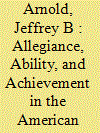

|
|
|
|
|
| Summary/Abstract |
How do the characteristics of military leaders relate to battlefield outcomes? To answer this question, we employ original battle-level data and biographical information on hundreds of commanders in more than 250 battles in the American Civil War. We examine the relationship between two common measures of battlefield success (victory and casualties) and two latent features of commanders—competence and loyalty—that have long been seen as important in the broader study of executive appointments. We find that competent commanders are associated with more successful battlefield outcomes, as are more loyal Confederate commanders. More broadly, our analysis suggests that focusing on the relationship between military appointments and battlefield outcomes—with the latter's relatively clear definition of “success”—allows for direct examination of the relationship between appointee traits and organizational performance. As such, our results have implications for the study of conflict as well as bureaucratic politics.
|
|
|
|
|
|
|
|
|
|
|
|
|
|
|
|
| 2 |
ID:
127256
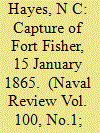

|
|
|
| 3 |
ID:
127374
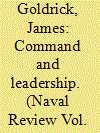

|
|
|
| 4 |
ID:
087604
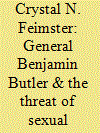

|
|
|
|
|
| Publication |
2009.
|
| Summary/Abstract |
As a young girl growing up in the
South, I was forced to watch Gone With
the Wind throughout my primary and
secondary education. As May dwindled
into June, teachers grew weary of lecturing
on multiplication tables or constitutional
history and resorted to "historical
½lms" to pass the time, with Gone With
the Wind at the top of the list. I hated the
movie at every age-and not because I
wanted to crawl under my desk and die
of humiliation every time a black person
came on screen. Rather, the ½lm's violent
content, speci½cally its sexual undertones,
gave me nightmares. In one
instance, Scarlett, confronted by a Yankee
soldier, shoves a pistol in his face
and pulls the trigger. The viewer understands
Scarlett's motivation: that implicit
in the "unspeakable horrors that
lay bound up in the name of 'Yankee'"
is the threat of rape.
|
|
|
|
|
|
|
|
|
|
|
|
|
|
|
|
| 5 |
ID:
168208


|
|
|
|
|
| Summary/Abstract |
In his seminal study of the changing nature of warfare between Agincourt and the Somme, military historian John Keegan proposed that future historians might consider combatants’ emotions in their assessments of the impact and nature of conflict. Recent years have witnessed the emergence of the history of emotions as an analytical approach, but rarely, if ever, is this directed toward the study of military history, far less the history of insurgencies and counter-insurgencies. This paper examines America’s civil war (1861–1865) as a case study of the ways in which an emotional history approach might illuminate not the physical experiences of but rather the immediate and longer-term reactions to counter-insurgency conflict through a focus on one specific individual, the future Supreme Court Justice Oliver Wendell Holmes, Jr. It proposes that Holmes, whilst not a man of the ranks, nevertheless can reveal the wider ramifications of civil war and its emotional impact, both individually and culturally. As a relatively limited internecine war, one not fought by professional armies but by volunteer forces, America’s civil war highlights the ways in which the soldier’s response points us toward the kind of emotional revolution that has, to date, mainly been located within the European nations.
|
|
|
|
|
|
|
|
|
|
|
|
|
|
|
|
| 6 |
ID:
118478
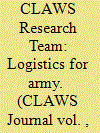

|
|
|
| 7 |
ID:
119318


|
|
|
| 8 |
ID:
031734


|
|
|
|
|
| Publication |
Yorkshire, Elmfield Press, 1974.
|
| Description |
vii, 188p.
|
| Standard Number |
0705700259
|
|
|
|
|
|
|
|
|
|
|
|
Copies: C:1/I:0,R:0,Q:0
Circulation
| Accession# | Call# | Current Location | Status | Policy | Location |
| 020905 | 355.48/WES 020905 | Main | On Shelf | General | |
|
|
|
|
| 9 |
ID:
082680
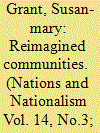

|
|
|
| 10 |
ID:
114724
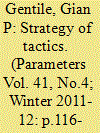

|
|
|
| 11 |
ID:
183792
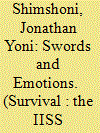

|
|
|
|
|
| Summary/Abstract |
State and non-state actors, from Hizbullah and the Islamic State (ISIS) to Russia and China, challenge Western nations with society-centric strategies. These employ wide-ranging tools – military force, economics, cyber and information – mainly to manipulate their rival societies’ collective emotions and hence their behaviour. Western countries have not always performed well in response, and a better understanding of such warfare and strategy is imperative. This article explores the American Civil War as an exemplary case of society-centric warfare. It analyses the Union’s coercive and conciliatory efforts to impact Southern collective emotions and behaviour, and the errors that drove counterproductive and escalatory results. It points to two aspects of a rival society that must be correctly assessed for effective society-centric strategy: its collective psychological predispositions – ethos, long-term sentiments and framing of the conflict – and its political culture and economy. It also points to universal psychological dynamics that must be accounted for when devising such strategy.
|
|
|
|
|
|
|
|
|
|
|
|
|
|
|
|
| 12 |
ID:
168517
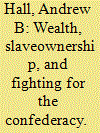

|
|
|
|
|
| Summary/Abstract |
How did personal wealth and slaveownership affect the likelihood Southerners fought for the Confederate Army in the American Civil War? On the one hand, wealthy Southerners had incentives to free-ride on poorer Southerners and avoid fighting; on the other hand, wealthy Southerners were disproportionately slaveowners, and thus had more at stake in the outcome of the war. We assemble a dataset on roughly 3.9 million free citizens in the Confederacy and show that slaveowners were more likely to fight than non-slaveowners. We then exploit a randomized land lottery held in 1832 in Georgia. Households of lottery winners owned more slaves in 1850 and were more likely to have sons who fought in the Confederate Army. We conclude that slaveownership, in contrast to some other kinds of wealth, compelled Southerners to fight despite free-rider incentives because it raised their stakes in the war’s outcome.
|
|
|
|
|
|
|
|
|
|
|
|
|
|
|
|
| 13 |
ID:
151765
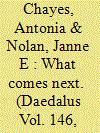

|
|
|
|
|
| Summary/Abstract |
Wars do not end when the last shot is fired. War planning has failed to demonstrate an understanding that victory requires consolidation and the emergence of a more healthy society. The most prominent recent example is the Second Iraq War, but the failure reaches back to the American Civil War. This essay is less concerned with the moral obligation to reconstruct after war than the practical necessity of jus post bellum. In order to learn how to achieve such a consolidation of military victory, a shift in mindset is required from both civil and military policy-makers and planners. A change in practice is required at the very beginning of planning for war. “Whole of government” has been an empty phrase, but experience dictates that an unprecedented degree of domestic and international cooperation is required.
|
|
|
|
|
|
|
|
|
|
|
|
|
|
|
|
| 14 |
ID:
038665
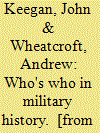

|
|
|
|
|
| Publication |
New Delhi, Vikas Publishing House Pvt Ltd, 1976.
|
| Description |
367p.: maps.Hbk
|
| Standard Number |
0706904990
|
|
|
|
|
|
|
|
|
|
|
|
Copies: C:1/I:0,R:0,Q:0
Circulation
| Accession# | Call# | Current Location | Status | Policy | Location |
| 016364 | 923.5/KEE 016364 | Main | On Shelf | General | |
|
|
|
|